高中英语语法之一般将来时 (1)
高中英语语法大全

高中英语语法大全高中英语语法:动词的时态。
(一)动词的时态。
时态动词是谓语动所表示的动作或情况发生时间的各种形式。
英语动词有 16 种时态,但是常用的只有 9 种:一般现在时、一般过去时、一般将来时、现在进行时、过去进行时、现在完成时、过去完。
成时、过去将来时、现在完成进行时。
下面分别介绍。
1、一般现在时的用法(do/does)。
1)表示经常性、习惯性的动作; 表示现在的状态、特征和真理。
句中常用 often, usually, every day, sometimes, every week/year, twice aweek 等时间状语。
例如: a. he goes to school every day. b. he is very happy. earth moves around the sun.。
2)在时间状语从句和条件状语从句中,用一般现在时表示将来。
例如:在时间状语从句和条件状语从句中,用一般现在时表示将来。
例如:a. if you come this afternoon, we’ll have a meeting.b. when i grad uate, i’ll go to countryside.。
3)有时这个时态表示按计划、规定按时间表要发生的动作(句中都带有时间,有时这个时态表示按计划、规定, 按时间表要发生的动作,但限于少数动词状语),但限于少数动词,如:begin, come,。
leave, go ,arrive, start , stop, return,open, close 等。
例如: a. the meeting begins at seven.。
b. the rain starts at nine in the morning.。
4)表示状态和感觉的动词(be, like, hate, think, remember, find, sound 等)常用一般现在进行时。
一般将来时英语范文
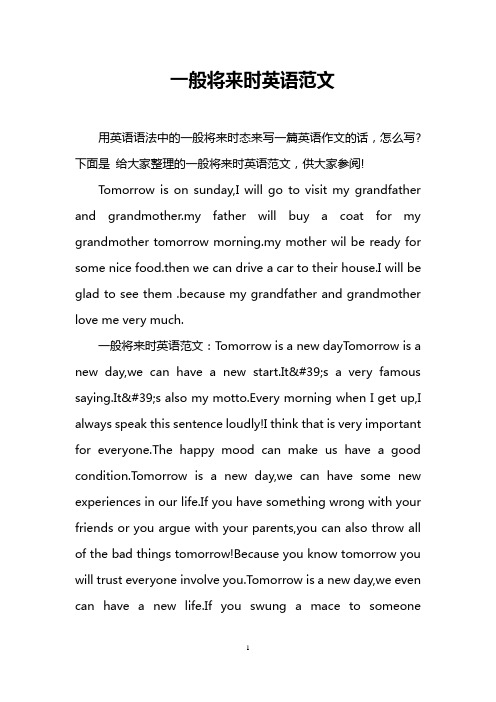
一般将来时英语范文用英语语法中的一般将来时态来写一篇英语作文的话,怎么写?下面是给大家整理的一般将来时英语范文,供大家参阅!Tomorrow is on sunday,I will go to visit my grandfather and grandmother.my father will buy a coat for my grandmother tomorrow morning.my mother wil be ready for some nice food.then we can drive a car to their house.I will be glad to see them .because my grandfather and grandmother love me very much.一般将来时英语范文:Tomorrow is a new dayTomorrow is a new day,we can have a new start.It's a very famous saying.It's also my motto.Every morning when I get up,I always speak this sentence loudly!I think that is very important for everyone.The happy mood can make us have a good condition.Tomorrow is a new day,we can have some new experiences in our life.If you have something wrong with your friends or you argue with your parents,you can also throw all of the bad things tomorrow!Because you know tomorrow you will trust everyone involve you.Tomorrow is a new day,we even can have a new life.If you swung a mace to someoneyesterday,you can be very friendly to him,too.Maybe you can gain a new friendship!Isn't that imgine?You can have a very special tomorrow on your power.Tomorrow is a new day.If you believe yourself ,you could be the stroller of life!一般将来时英语范文:if i have enough moneyif i have enough money,i will travel for seven days.the fitst day,i will go to beijing.because beijing is the capital city of china.first,i will go to tian'anmen square.and then,i will go to the palace museum.then,i will go to my grandparents'house .i miss them very much.from the third day to the sixth day,i will go to qingdao with my friends.i will go to swim in qingdao.at the last day,i will go on a trip to my city. i want to know my city carefully,I think i will have fun.如果我有足够的钱如果我有足够的钱,我将去施行七天.第一天我要去北京,因为北京是中国的首都.首先,我要去天安门广场,然后去故宫博物院.接下来我去我的爷爷,奶奶家,我非常相信他们.从第三天到第六天,我要和朋友们去青岛.在青岛我要去游泳.最后一天,我要在我所在的城市环城旅行.我想更好地了解我的城市.我想我会过得很愉快.一般将来时英语范文I want to be a doctor in the future.I will help sick people.I will also earn a lot of money.英语作文语法:一般将来时1) shall用于第一人称,常被will 所代替。
高中英语语法复习讲义+训练:动词的时态(含答案)

中学英语语法复习讲义——动词的时态一. 概念:时态是英语谓语动词的一种形式,表示动作发生的时间和所处的状态.英语中的时态是通过动词形式本身的变更来实现的.英语有16种时态,但中学阶段较常用的有十种:一般现在时,一般过去时,一般将来时,过去将来时,现在进行时,过去进行时,将来进行时,过去完成时,英在完成时和现在完成进行时.二.相关学问点精讲1.一般现在时的用法1) 常常性或习惯性的动作,常与表示频腮度的时间状语连用。
时间状语:every…, sometimes,at…, on Sunday。
例如:I leave home for school at 7 every morning. 每天早上我七点离开家。
2) 客观真理,客观存在,科学事实。
例如:The earth moves around the sun. 地球绕太阳转动。
Shanghai lies in the east of China. 上海位于中国东部。
3) 表示格言或警句。
例如:Pride goes before a fall.骄者必败。
留意:此用法假如出现在宾语从句中,即使主句是过去时,从句谓语也要用一般现在时。
例:Columbus proved that the earth is round. 哥伦布证明了地球是圆的。
4) 现在时刻的状态、实力、性格、特性。
例如:I don't want so much. 我不要那么多。
Ann writes good English but does not speak well. 安英语写得不错,讲的可不行。
比较:Now I put the sugar in the cup. 把糖放入杯子。
I am doing my homework now. 我正在做功课。
第一句用一般现在时,用于操作演示或指导说明的示范性动作,表示言行的瞬间动作。
其次句中的now是进行时的标记,表示正在进行的动作的客观状况,所以后句用一般现在时。
(完整版)高中一般将来时讲解

(完整版)高中一般将来时讲解高中一般将来时讲解(完整版)一般将来时是英语语法中的一个重要时态,用来表示将来发生的动作或状态。
在高中阶段,学生需要掌握和运用一般将来时来描述将来的计划、意图、预测等。
下面我们将详细介绍高中一般将来时的使用和构成。
使用一般将来时可以用于以下几种情况:1. 表示将来的计划或安排。
例如:I will go to the beach this weekend.(我将在这个周末去海滩。
)2. 表示将来的意图。
例如:She will study medicine in college.(她打算在大学研究医学。
)3. 表示将来的预测或推测。
例如:It will rain tomorrow.(明天会下雨。
)构成一般将来时的构成非常简单,只需将"will"(shall)加在动词的原形前即可。
例如:I will study.(我将要研究。
)He will go.(他将要去。
)注意事项在使用一般将来时时,还需要注意以下几点:2. 疑问句的构成是将"will"(shall)置于句首。
例如:Will you attend the meeting?(你会参加会议吗?)3. 一般将来时通常不能用于表示固定的时间表或时间表安排,此时应使用其他时态。
例如:The train leaves at 9 a.m.(火车在上午9点离开。
)希望以上内容能够帮助你更好地理解和运用高中一般将来时。
如果还有任何问题,请随时向我提问。
新版高中英语必修一语法归纳

新版高中英语必修一语法归纳以下是新版高中英语必修一的语法归纳:1. 一般现在时- 主谓一致:主语为第三人称单数时,动词加-s或-es结尾。
- 经常行为或习惯:常与频率副词(always, usually等)连用。
- 现在的状况:表现为客观事实,不受时间限制。
2. 一般过去时- 过去发生的动作或状态:一般用于描述过去的事件。
- 常用的过去时间状语:yesterday(昨天)、last week(上周)、two days ago(两天前)等。
3. 现在进行时- 正在进行的动作:强调当前正在进行的动作。
- 现阶段的暂时状态:暂时性动作或活动。
4. 一般将来时- 将来计划或打算:表示发生在将来的动作或事件。
- 含有明确将来时间状语的句子:tomorrow(明天)、next week(下周)等。
5. 宾语从句- 引导词:that, whether, if等引导宾语从句。
- 动词的时态:从句的谓语动词根据主从句的关系而选择相应的时态。
6. 定语从句- 引导词:关系代词(who, whom, whose, which, that)或关系副词(when, where, why)引导定语从句。
- 关系代词的选择:who和that可指人或物,而which和that 只能指物。
7. 状语从句- 时间状语从句:描述时间的状语从句,多由when, while, as soon as等引导。
- 原因状语从句:描述原因的状语从句,多由because, since, as 等引导。
- 条件状语从句:描述条件的状语从句,多由if, unless, so long as等引导。
8. 虚拟语气- 表示与事实相反的虚拟条件:主句用过去式、从句用过去完成时。
- 表示与现实相反的虚拟条件:主句用过去完成时、从句用过去完成时。
9. 非谓语动词- 动名词:作主语、宾语或表语,形式为动词+ing。
- 不定式:可以作主语、宾语、定语或状语,形式为to+动词原形。
(完整)高中英语语法(时态和语态)

高中英语语法(时态和语态)一.动词的时态时态是谓语动词所表示的动作或情况发生时间的各种形式。
英语动词有16种时态,但是常见的只有九种:一般现在时、一般过去时、一般将来时、现在进行时、过去进行时、现在完成时、过去完成时、过去将来时、现在完成进行时。
(一)一般现在时(do / does)1. 具体用法1)表示经常性或习惯性动作We always care for each other and help each other. 我们总是互相关心互相帮助。
He goes to school every day.2)表示现在的特征或状态He is very happy.Do you si ng? ----A little.3)表示普遍真理Light travels faster than sound. 光速比声速快。
Actions speak louder tha n words. 行动胜过言语。
*常与一般现在时态连用的词或短语主要有:often, usually, sometimes, every day,every morning/afternoon, on Sundays/weekends 等等。
I ofte n go to the cin ema on Sun days. 我经常星期天去看电影。
He goes to work early every day. 他每天上班很早。
(二)一般过去时(did )(1)表示过去某一特定时间所发生的、可完成的动作或状态,常与表示确切过去时间的词、短语或从句连用。
例如:We went to the pictures last ni ght and saw a very in teresti ng film.(2)表示过去习惯性动作。
例如:He always went to class last.I used to do my homework in the library.(三)一般将来时(will / shall do)1)表示将来打算进行或期待发生的动作或状态。
一般将来时的四种句型结构
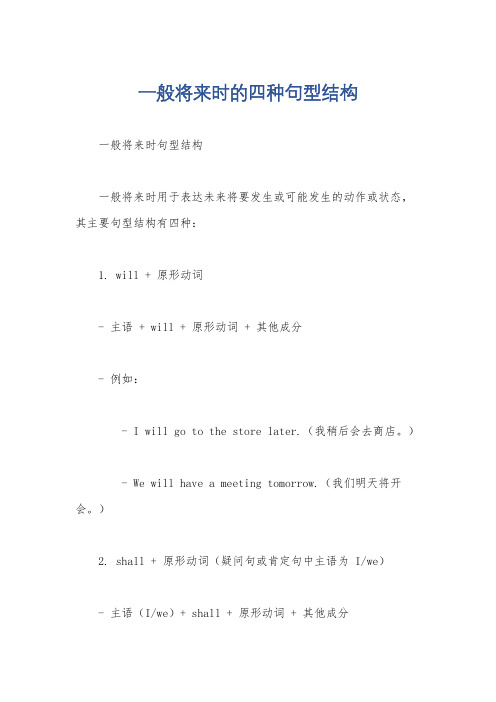
一般将来时的四种句型结构一般将来时句型结构一般将来时用于表达未来将要发生或可能发生的动作或状态,其主要句型结构有四种:1. will + 原形动词- 主语 + will + 原形动词 + 其他成分- 例如:- I will go to the store later.(我稍后会去商店。
)- We will have a meeting tomorrow.(我们明天将开会。
)2. shall + 原形动词(疑问句或肯定句中主语为 I/we)- 主语(I/we)+ shall + 原形动词 + 其他成分- 例如:- Shall I open the window?(我打开窗户好吗?)- We shall arrive at 10:00 AM.(我们将在上午 10:00 到达。
)3. be going to + 原形动词- 主语 + be going to + 原形动词 + 其他成分- 例如:- I am going to watch a movie tonight.(我今晚要去看电影。
)- They are going to build a new house.(他们打算建造一所新房子。
)4. be + about to + 原形动词- 主语 + be about to + 原形动词 + 其他成分- 例如:- I am about to leave.(我就要走了。
)- The train is about to depart.(火车就要出发了。
)一般将来时的用途一般将来时主要用于以下几种情况:- 表达未来将要发生的肯定动作或事件- 表达未来可能发生的动作或事件- 表示计划或打算- 表达预测或推测- 表示请求或建议(使用 shall 时)- 表示承诺或保证(使用 will 时)。
高考英语语法之常用时态知识点讲义

高中英语语法之常用时态知识点和练习题英语六种常用时态知识点一、一般现在时 (be;do/does)1.概念:表示现在发生的动作、情况、状态和特征。
经常性、习惯性动作。
标志词:often, sometimes, usually, always, occasionally 等和时间状语如 in the evening, at night, twice a month, on Sundays, every day/week/month/year,等。
用法:(1).客观事实和普遍真理。
The earth runs around the sun.(2)表示一个按规定、计划或安排要发生的动作,(仅限于某些表示“来、去、动、停、开始、结束、继续”等的动词)可以与表示未来时间的状语搭配使用。
常见的用法是:飞机、火车、轮船、汽车等定期定点运行的交通方式。
The next train leaves at 3 o'clock this afternoon.下一趟火车今天下午3点开车。
How often does this shuttle bus run?这班车多久一趟?(3)在由 when, after, before, until, till, as soon as,等引导的时间状语从句或由if, so/as long as, once, even if, although, whether…or…, in case, whatever, whenever, wherever 等引导的条件状语从句中,通常用一般现在时代替一般将来时(主将从现)。
When you have finished the report, I will have waited for about 3 hours.等你完成这份报告的时候,我就已经等了将近3个小时了。
二、一般过去时1.概念:表示过去某个时间发生的动作或情况。
2.标志词:yesterday, last year, last night, the other day, just now, then, two days ago, in , at that time等。
初高中时态衔接课件之一般现在时一般过去时及一般将来时课件_1

100% always 90% usually 80% generally 75% often 50% sometimes 25% occasionally 10% seldom 5% rarely 2% hardly ever 0% never
1.表示经常性的动作/习惯
He often chats with girls at mid-night, which explains why he has dark circles under his eyes. 他总是和辣妹激情热聊到半夜,所以他有黑眼圈。
--This top expert has came back to China!
谓
--Yes, I know him very well. He ___________in Africa with
语
animals for ten years.
动
A has worked
词
B. had worked
一般将来时
辨析:be going to do v.s. will do
如果你每天看电视,你就会长胖 If you watch TV everyday, you will be overweight.
一般将来时
辨析:be going to do v.s. will do
Be going to do :计划性 Will do: 自然而然会发生
更多将来形式
tips:be doing 部分见进行态
1. be to do=be doing 计划、打算做某事 (进行时表将来)
You are to finish your summer vacation homework tomorrow.
高中英语语法必备之谓语动词的时态和语态详解
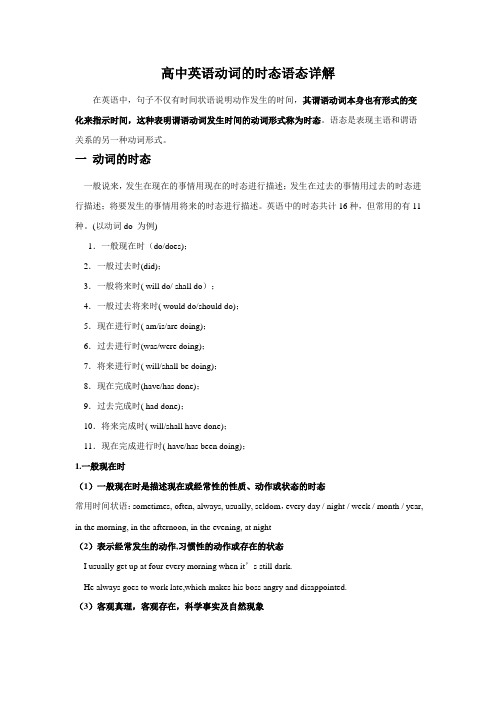
高中英语动词的时态语态详解在英语中,句子不仅有时间状语说明动作发生的时间,其谓语动词本身也有形式的变化来指示时间,这种表明谓语动词发生时间的动词形式称为时态。
语态是表现主语和谓语关系的另一种动词形式。
一动词的时态一般说来,发生在现在的事情用现在的时态进行描述;发生在过去的事情用过去的时态进行描述;将要发生的事情用将来的时态进行描述。
英语中的时态共计16种,但常用的有11种。
(以动词do 为例)1.一般现在时(do/does);2.一般过去时(did);3.一般将来时( will do/ shall do);4.一般过去将来时( would do/should do);5.现在进行时( am/is/are doing);6.过去进行时(was/were doing);7.将来进行时( will/shall be doing);8.现在完成时(have/has done);9.过去完成时( had done);10.将来完成时( will/shall have done);11.现在完成进行时( have/has been doing);1.一般现在时(1)一般现在时是描述现在或经常性的性质、动作或状态的时态常用时间状语:sometimes, often, always, usually, seldom,every day / night / week / month / year, in the morning, in the afternoon, in the evening, at night(2)表示经常发生的动作,习惯性的动作或存在的状态I usually get up at four every morning when it’s still dark.He always goes to work late,which makes his boss angry and disappointed.(3)客观真理,客观存在,科学事实及自然现象The sun rises in the east and sets in the west every day.The man who has never been to the Great Wall is not a real man.Trees turn green in spring. Liquid turns into gas when it is hot enough.(4)表示格言或警句中Pride goes before a fall.Knowledge is power.Practice makes perfect.(5)一般现在时表将来表示已经计划、安排好了或时间表上所安排,并且一定要做的事情。
2024年人教版中考英语一轮复习语法课件一般将来时(1)

将来时的一般疑问句型结构
将 Will+主语+动词原形
来 时
Be+主语+ going to+动词原形
结 Be+主语+v-ing
构
Do+ 主语+一般现在时表将来
Will+主语+动词
肯定回答:Yes,主语+will 否定回答: No,主语+won’t
Will she go to thepark tomorrow?
初中英语语法
一般将来时
目录 CONTENTS
将来时的含义 将来时的肯定句句型结构
将来时的否定句结构 将来时的一般疑问句型结构 将来时的特殊疑问句句型结构
将来时的含义
将来时的含义 将来时的肯定句句型结构 将来时的否定结构 将来时的一般疑问句型结构 将来时的特殊疑问句句型结构
将来时的含义
将要发生
➢相对于讲话时间 ➢ 将要发生 ➢ 动作或情况
将来时的否定句句型结构
将来时的含义 将来时的肯定句句型结构 将来时的否定句句型结构 将来时的一般疑问句型结构 将来时的特殊疑问句句型结构
一般将来时的否定结构
主语+ will not( won’t) +动词原形
将 来
(I /we shall not )
时
主语+be+not+going to+动词原形
看那些乌云要下雨了. Loot at the dark clouds. It _is__g_o_in_g__t_o_rain.
主语+一般现在时表将来
go, come, leave, start, arrive, stay, fly, land, take of
英语语法之一般将来时

4)shall not 的缩写形式为shan’t; will not的缩 写形式为won’t. They’ll take part in the sports meet next week. 下周他们将参加运动会。 She won’t accept my suggestion. 她不接受我的建议。 5)be going to和will在含义和用法上略有不同。 be going to往往表示事先经过考虑的打算;will多 表示意愿、决心。有时不能互换。 比如:I have bought some books and I am going to learn Korean by myself. 我买了些书,我要自学韩语。(不能用will换)
Grammar
一般将来时
一般将来时表示将要发生的动作或存在的状态, 将来打算做的事情。
ห้องสมุดไป่ตู้
一般将来时的构成:
1.主语+be going to+动词原形 I’m going to paint it pink. 2.主语+shall/will+动词原形 I will miss him.
初高中英语语法--一般将来时与将来完成时

- Watch out! That parcel is going
to fall.
The future progressive/continuous (will be+ Ving)
Function
1. For an action, which will be in progress at a time in the future.
- By the end of this week, I will have been waiting for three weeks for my phone to be installed.
Function
1. For an action, which begin before a certain future time and will not have finished by that time. It stresses the continuity of the action.
Example
Will + V1
Example
A: what would you like to have?B: I’ll have an orange juice. The President will open the new hospital next Friday.
3. To express a willingness or unwillingness to carry out a future action a) To make a promise b) To make an offer 4. To make a prediction a) To express a certainty or uncertainty (with maybe, perhaps, I’m sure, I’m not sure, etc) b) To express thoughts, hopes, beliefs, and expectations about the future 5. To talk about an event which is certain to happen
高一英语语法(2-3):动词的时态之一般将来时、过去将来时和将来完成时
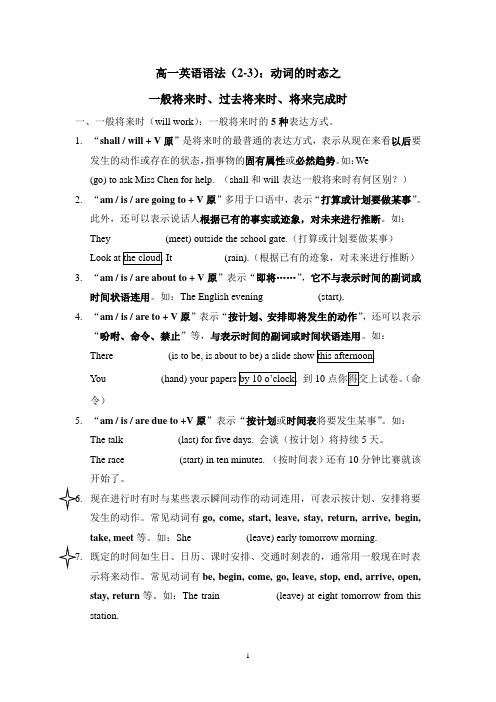
高一英语语法(2-3):动词的时态之一般将来时、过去将来时、将来完成时一、一般将来时(will work):一般将来时的5种表达方式。
1.“shall / will + V原”是将来时的最普通的表达方式,表示从现在来看以后要发生的动作或存在的状态,指事物的固有属性或必然趋势。
如:We __________ (go) to ask Miss Chen for help. (shall和will表达一般将来时有何区别?)2.“am / is / are going to + V原”多用于口语中,表示“打算或计划要做某事”。
此外,还可以表示说话人根据已有的事实或迹象,对未来进行推断。
如:They __________ (meet) outside the school gate.(打算或计划要做某事)(根据已有的迹象,对未来进行推断)3.“am / is / are about to + V原”表示“即将……”,它不与表示时间的副词或时间状语连用。
如:The English evening __________ (start).4.“am / is / are to + V原”表示“按计划、安排即将发生的动作”,还可以表示“吩咐、命令、禁止”等,与表示时间的副词或时间状语连用。
如:到10(命令)5.“am / is / are due to +V原”表示“按计划或时间表将要发生某事”。
如:The talk __________ (last) for five days. 会谈(按计划)将持续5天。
The race __________ (start) in ten minutes. (按时间表)还有10分钟比赛就该开始了。
现在进行时有时与某些表示瞬间动作的动词连用,可表示按计划、安排将要发生的动作。
常见动词有go, come, start, leave, stay, return, arrive, begin, take, meet等。
英语语法大全之16种时态规则

英语语法大全之16种时态规则一、一般现在时(Simple Present Tense)1. 表示经常性或普遍性的动作、状态或喜好。
例:He eats breakfast every day.(他每天吃早餐。
)例:I like watching movies.(我喜欢看电影。
)二、现在进行时(Present Continuous Tense)1. 表示现在正在进行的动作。
例:She is studying in the library.(她正在图书馆研究。
)例:They are playing soccer in the park.(他们正在公园踢足球。
)三、一般过去时(Simple Past Tense)1. 表示过去发生的动作或状态。
例:I went to the party last night.(我昨晚去了派对。
)例:She studied English in college.(她在大学里研究英语。
)四、过去进行时(Past Continuous Tense)1. 表示过去某一时间正在进行的动作。
例:I was watching TV when she called.(她打电话时,我正在看电视。
)例:They were playing basketball yesterday afternoon.(昨天下午他们在打篮球。
)五、一般将来时(Simple Future Tense)1. 表示将来某个时间要发生的动作或状态。
例:We will have a meeting tomorrow.(我们明天有一个会议。
)例:He will visit his grandparents next week.(下周他会去探望他的祖父母。
)六、将来进行时(Future Continuous Tense)1. 表示将来某一时间将在进行的动作。
例:I will be working on my project this time next week.(下星期的这个时候我将会在做我的项目。
高中英语语法八个时态归纳总结
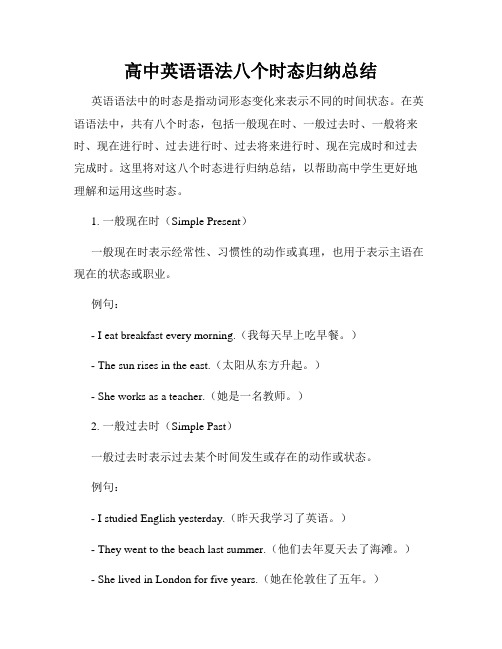
高中英语语法八个时态归纳总结英语语法中的时态是指动词形态变化来表示不同的时间状态。
在英语语法中,共有八个时态,包括一般现在时、一般过去时、一般将来时、现在进行时、过去进行时、过去将来进行时、现在完成时和过去完成时。
这里将对这八个时态进行归纳总结,以帮助高中学生更好地理解和运用这些时态。
1. 一般现在时(Simple Present)一般现在时表示经常性、习惯性的动作或真理,也用于表示主语在现在的状态或职业。
例句:- I eat breakfast every morning.(我每天早上吃早餐。
)- The sun rises in the east.(太阳从东方升起。
)- She works as a teacher.(她是一名教师。
)2. 一般过去时(Simple Past)一般过去时表示过去某个时间发生或存在的动作或状态。
例句:- I studied English yesterday.(昨天我学习了英语。
)- They went to the beach last summer.(他们去年夏天去了海滩。
)- She lived in London for five years.(她在伦敦住了五年。
)3. 一般将来时(Simple Future)一般将来时表示将来某个时间要发生的动作或存在的状态。
例句:- I will go shopping tomorrow.(我明天要去购物。
)- They are going to visit their grandparents next month.(他们下个月要去看望他们的祖父母。
)- She is going to study abroad after graduation.(她毕业后打算出国留学。
)4. 现在进行时(Present Continuous)现在进行时表示现在正在进行的动作或状态。
例句:- I am reading a book right now.(我现在正在读一本书。
一般将来时
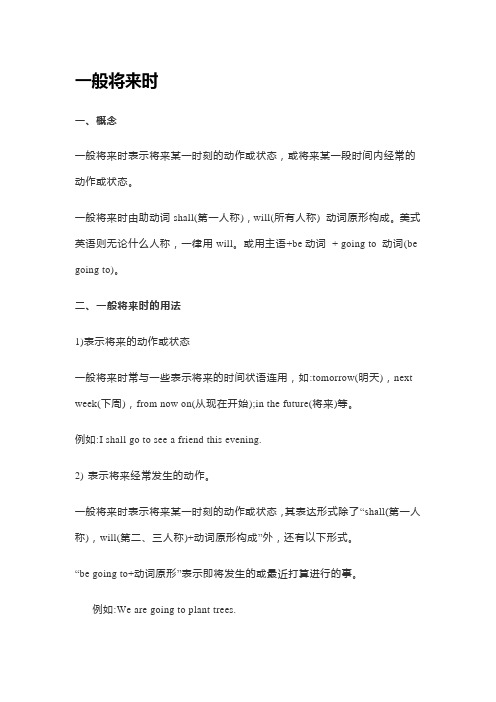
一般将来时一、概念一般将来时表示将来某一时刻的动作或状态,或将来某一段时间内经常的动作或状态。
一般将来时由助动词shall(第一人称),will(所有人称) 动词原形构成。
美式英语则无论什么人称,一律用will。
或用主语+be动词+ going to 动词(be going to)。
二、一般将来时的用法1)表示将来的动作或状态一般将来时常与一些表示将来的时间状语连用,如:tomorrow(明天),next week(下周),from now on(从现在开始);in the future(将来)等。
例如:I shall go to see a friend this evening.2)表示将来经常发生的动作。
一般将来时表示将来某一时刻的动作或状态,其表达形式除了“shall(第一人称),will(第二、三人称)+动词原形构成”外,还有以下形式。
“be going to+动词原形”表示即将发生的或最近打算进行的事。
例如:We are going to plant trees.三、一般将来时的句型①肯定句:主语+ be going to do /will/shall+ 动词原形②否定句:主语+ be not going to do /will not/shall not+ 动词原形③疑问句:Be动词+主语+ going to do /Will/Shall+主语+ 动词原形简略回答:(肯)Yes,主语shall/will (否) No,主语+shan't/won't④特殊疑问句:特殊疑问词+一般疑问句(就主语提问时,以疑问词who开头的疑问词除外)----- Why will you be here on Sunday?(周日你为什么将要在这儿?)-----I will have a meeting on Sunday(我将要在周日举行一个聚会)(对特殊疑问句要进行具体回答)一般疑问句:be或will提到句首,some改any,and改or,第一二人称互换We are going to go on an outing this weekend.-------Are you going to go on an outing this weekend?被动句:will/shall+be+v.ed(及物动词过去分词)The letter will be sent tomorrow.这封信明天将寄出去We shall be punished if we break the rule.如果我们违反规定,我们将受到惩罚。
英语高中语法将来时

动词的将来时一般将来时:一般将来时的定义:一般将来时表示在现在时间以后的时间(将来)里要发生的事或情况。
常与表示将来时间的如next week, tomorrow, in the future等时间状语连用。
(回顾过去时)2.一般将来时的句型结构:(1)主语+will/shall+动词原形① shall一般用于第一人称,常用于疑问句,表示征求对方意见。
(shall we…?/ shall I…?)例如: Shall I carry your bag?(表示征求意见)Shall we go to the museum next Sunday?(表示询问情况)练习:我们现在走吗?我要记下电话号码吗?will可用于各种人称表示将要发生的动作,情况,状态,或意愿。
例如: She will come tomorrow.She will be a perfect wife in the future.How long will the meeting last?否定形式:will not/ won’t例如:You won’t be the first one to come.疑问句: Will +主语…?例如:Will he help you to finish your homework?练习:下星期他会举办一个生日派对, 你会来吗? ---不,我不会。
(2)be going to+动词原形be going to和will都可以表示“打算,将要做某事”,一般可以互换。
例如:I will do my homework tomorrow.I am going to do my homework tomorrow.注意:①表示客观上必然会发生的事时,不宜用“be going to+动词原形”。
例如:Tomorrow will be Friday. (正确)Tomorrow is going to be Friday. (错误)②be going to可以表示说话人根据已有的事实,认为某事将要发生。
高中英语语法:动词的时态与语态

高中英语语法:动词的时态与语态We have meals three times a day.我们一日吃三餐。
(现在的习惯)He is always ready to help others.他总是乐于助人。
(现在的状态)When I was a boy, I often went to play in that park.我小时候常去那个公园玩。
(过去的习惯)1.一般现在时(1)一般现在时的构成一般现在时主要用动词的原形表示,如果主语为第三人称单数,则一般在动词原形后加s或-一般现在时除了可以表示现在的经常性、习惯性动作或存在的状态外,还可表示:①客观真理、科学事实及自然现象。
此用法即使出现在过去语境中,也用一般现在时。
The sun rises in the east.太阳从东方升起。
②用于here, there开头的倒装句中,一般现在时表示现在正在发生的动作或存在的状态。
There goes the bell.铃响了。
Here comes the bus.公共汽车来了。
2.一般过去时(1)一般过去时的构成(2)一般过去时的用法一般过去时除了可以表示过去经常性、习惯性的动作或存在的状态外,还有以下用法:①want, hope, think, intend等动词的一般过去时往往表示“过去原……”之意。
I thought he was an honest man.我原以为他是个老实人。
He didn't intend to hurt you.他本来没打算伤害你。
②wonder的一般过去时有时也可表示现在的行为,但口气要比用一般现在时更加委婉、客气。
I wondered if you could do me a favour.我不知道你能否帮我一个忙。
③used to+动词原形,表示过去的习惯性动作而现在已经不再发生了。
We used to spend our vacation in the mountains.我们以前常常在山里度假。
- 1、下载文档前请自行甄别文档内容的完整性,平台不提供额外的编辑、内容补充、找答案等附加服务。
- 2、"仅部分预览"的文档,不可在线预览部分如存在完整性等问题,可反馈申请退款(可完整预览的文档不适用该条件!)。
- 3、如文档侵犯您的权益,请联系客服反馈,我们会尽快为您处理(人工客服工作时间:9:00-18:30)。
Yes, there will. / No, there won’t.
整理ppt
13
Exercises
1. — What would you do if it _____ tomorrow ?
— We have to carry it on, since we’ve got everything
ready.
Work hard or you will fail. 努力工作否则你就会失败。 Work hard and you will succeed. 努力工作你就会成功。
整理ppt
6
be going to
①表示计划,安排要做的事 --- What _a_r_e__y_o_u_g_o_i_n_g__to__do this evening?
The evening class begins at 19:00. 晚课7点开始。 The train starts at two. 火车两点出发.
整理ppt
11
主将从现
• 在时间或条件状语从句中,主句用将来时,从句用 一般现在时表示将来时,标志:when, as soon as, before, once, if , unless, even if, in case等
Spring will come a有时表示说话时的临时决定或打算。
--- My car won’t start.
--- Don’t worry, I will come and give it a push.
整理ppt
4
will 和 shall 的缩写形式都是’ll
A. rain C. will rain
√B. rains D. is raining
③官方计划或决定(常见于报纸或广播)
e.g.
He and I are to meet at the railway station tomorrow.
You are not to be back late.
If not watered, the plants are to die.
The president is to speak on TV tonight.
整理ppt
8
be about to do
表示正要做…,马上要做... (不能与表示将来的时间状语连用) 特殊句式:was /were about to do … when…
正要…突然发生…
• 英语晚会即将开始。
• The English Evening Party is about to begin.
• If you come this morning, we will have a meeting. When I graduate, I will go to the countryside
整理ppt
12
“There be”句型的一般将来时
肯定句: There will be +名词+其他成份
soon (很快)
in the future (将来) in three days (三天后)
some day (将来的某一天)
整理ppt
2
结构
1.will+动词原形 (I /we shall) 2.be going to + 动词原形 3.be+to do 表示计划,责任,约定或命令 4. be about to do sth. 表示正要做…,马上要做…
一般将来时
1、表示将来某一时刻即将发生的动作或状态 2、表示将来经常发生的动作 3、表示将来的必然趋势或某事物所具有的固有特性
整理ppt
1
用法
与表示将来的时间状语连用,如:
tomorrow (明天)
before long (不久)
the day after tomorrow (后天)
next week (下周)
--- I am going to do my lessons.
②表示现在的迹象推断未来可能发生某事。
看那些乌云要下雨了.
Loot at the dark clouds. It _i_s_g_o_i_n_g_t_o_rain.
整理ppt
7
be to do
①表按计划或安排即将发生的动作
②表示约定,责任,命令,或注定要发生的动作。
(不能与表示将来时间的状语连用) 5.be+doing sth. 6.一般现在时表将来
整理ppt
3
will与shall+v.
• 1. 表示一个将来的动作或状态,“要…,会…”
She will go to the park tomorrow.
• 2. 表示不以人的意志为转移的自然发展的事。
Tom will be 18 next year.
[注意]:无论后面加单数名词或复数形式,be都必须用原形。
There will be only one country.
否定句:在will后面加not.
There won’t be only one country.
一般疑问句:把will提到there之前。
Will there be only one country?
注意:shall与will的区别:
shall
shall常用于第一人称. 否定式:shall not = shan’t
will
will常用于第二、三人称,但在口语中各种人 称都可以用will.
否定式:will not = won’t
整理ppt
5
will与shall+v.
• 祈使句+ and/or+将来时(will)
We’re leaving for Qingdao. 我们明天动身去青岛.
整理ppt
10
特殊用法
表示 与生日,日历,课时安排或交通时刻表有关的动作( 一种规律) ,用一般现在时表示将来时态。 常用于转移动词如:begin, come , leave, go, arrive, start, stop, return, open, close…
• 我正要出去,这时下起了雨.
• I was about to go out when it began to rain.
整理ppt
9
be doing
go, come, leave, start, arrive, stay, fly, land, take off 等动词可用现在进行时表示安排和划或即将发生的 动作。
